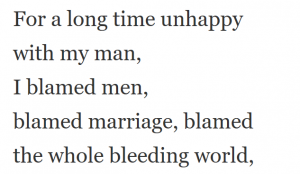While Jong’s most famous work is her novel Fear of Flying, her other works include many poems, one of which starkly contrasts with her novel. Fear of Flying rejected a sense of wifely duties towards one’s husband and mainly focused on female sexual desire. In her poem “The Truce Between the Sexes,” the speaker tells a sad story about how she “blamed men, / blamed marriage blamed / the whole bleeding world” for her inability to write freely. The speaker goes on to say that in order to free her poetry and herself she had to “divorce the lie.”

However, while the poem begins with a similar theme to Fear of Flying: dissatisfaction with marriage, it ends on a more positive note of finding Jong’s inner poet as well as a new lover along the way. This lover is different: “he is not Men, man, male- / all those maddening m’s,” he is “a person like [her].” This distinction is crucial, as it shows a more romantic side to Jong; her heart is lightened and trusting of the new man in her life, exhibiting her actual love for this man. In Fear of Flying, Jong makes Isadora’s desires primarily physical, yet in “The Truce Between the Sexes,” Jong is more interested in normal aspects of a real relationship: weathering anger and arguments, and holding one another in weak moments. She genuinely loves him, even after all of the contempt she harbored for the men of the world. To Jong, this man was not a man, but “a person with a penis / could dream, tell jokes, even cry.”

Jong then proceeds to wonder if she ever could truly enjoy the pause of the battle between sexes: “Erica, Erica, / you are hard on yourself / lie back & enjoy the cease-fire.” Jong’s use of her own name identifies this poem even more closely with the poet herself. This line captures this internal battle for Jong: could she really let go of the pain in her past at the hands of men? Could she trust that it wouldn’t happen again? Jong is not naïve enough to believe that all of her troubles are over, yet she says, “there will be trouble enough, / but of a different sort.” This line is truly striking as it gives the reader insight into Jong’s personal feelings. She knows that nothing is easy, yet this new trouble, with her new lover, is the type she can handle. For Jong, the true love is worth the troubles ahead.
![]()
Sources:
Jong, Erica. “The Truce Between the Sexes.” Poeticous, Poeticous, 4 May 2016, www.poeticous.com/erica-jong/the-truce-between-the-sexes. Accessed 28 November, 2018.
